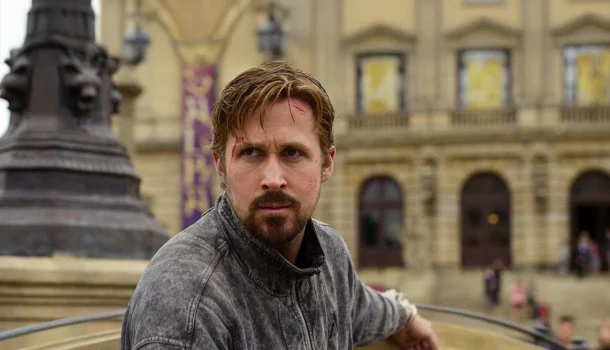If contemporary action cinema increasingly operates as a vast laboratory of aesthetic and symbolic recycling, “The Gray Man” functions as a calculated risk equation, where Ryan Gosling’s presence is far from ornamental — it’s a strategic move in an ambitious game. More than a movie star — with credentials that span the lyricism of “La La Land” and the silent brutality of “Drive” — Gosling here serves as an artistic seal of credibility for a venture that aims to balance formal sophistication with broad appeal. His placement on this chessboard suggests that Netflix is no longer content with mediocrity disguised as mass content; it wants status, impact, and permanence.
With a $200 million budget, the most expensive production ever by the platform does not shy away from its desire for a leading role in the modern blockbuster pantheon. Directed by the Russo brothers — seasoned in orchestrating grand narratives with operatic flair, as seen in “Avengers: Endgame” — the film aims to establish its own franchise with a Hollywood DNA and transnational ambitions. Based on Mark Greaney’s debut novel, “The Gray Man” is less concerned with espionage per se and more with using it as a pretext to build a combat mythology, where each character operates as a cog in a war machine choreographed to the extreme.
Gosling plays Sierra Six, a spy pulled from obscurity by a high-ranking CIA official, Donald Fitzroy (Billy Bob Thornton), and immediately thrust into a new mission under the command of a more dubious superior, Denny Carmichael (Regé-Jean Page). The task? Neutralize Lloyd Hansen, a former CIA agent turned sociopathic mercenary with a taste for torture and inappropriate jokes, played by a delightfully off-type Chris Evans. The clash between Six and Hansen is less a straightforward battle between opposites and more an allegory for the limits of institutional morality — a duel where virtue, if it exists, is always compromised by conflicting interests.
The narrative structure leans heavily on relentless momentum, but it’s the narrative friction that makes the film compelling. The screenplay, penned by Christopher Markus, Stephen McFeely, and Joe Russo, toys with unexpected touches — from homoerotic subtext to sharp ironic dialogue — without ever tipping fully into parody. Even as it flirts with “Mission: Impossible” territory, the film avoids emotional flatness by introducing Claire, the young hostage played by Julia Butters, whose bond with the protagonist reveals a more vulnerable layer beneath Six’s hardened surface.
Ana de Armas’s character, Dani Miranda, though underused from a dramatic standpoint, functions as a volatile moral anchor — not entirely trustworthy, yet crucial within the shifting balance of forces. The same can be said of the story itself: it doesn’t matter if the plot devices come straight out of a generic espionage manual, because the film’s visual machinery and the strength of its cast do enough to steer attention away from predictability and toward a more refined sensory experience.
“The Gray Man” doesn’t aim to reinvent or deconstruct the genre. What it does — with admirable self-awareness — is claim a space that once seemed reserved for major studio franchises: that of building a distinctive narrative identity through the strength of its performers and the technical finesse of its action sequences. If there’s a superhero in this film, he wears no cape and has no powers — but he carries on his shoulders the weight of a cinema trying, in its own way, to prove that entertainment and excellence don’t have to be enemies.
Film: The Gray Man
Director: Anthony and Joe Russo
Year: 2022
Genres: Action/Mystery
Rating: 9/10

